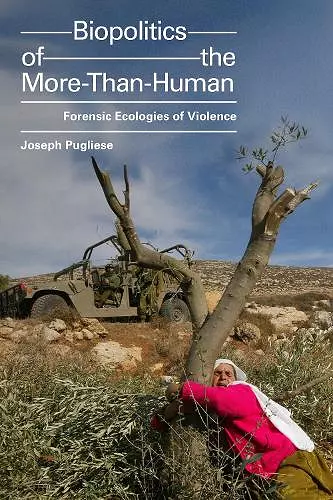Biopolitics of the More-Than-Human
Forensic Ecologies of Violence
Format:Hardback
Publisher:Duke University Press
Published:6th Nov '20
Currently unavailable, and unfortunately no date known when it will be back
This hardback is available in another edition too:
- Paperback£22.99(9781478008026)

In Biopolitics of the More-Than-Human Joseph Pugliese examines the concept of the biopolitical through a nonanthropocentric lens, arguing that more-than-human entities—from soil and orchards to animals and water—are actors and agents in their own right with legitimate claims to justice. Examining occupied Palestine, Guantánamo, and sites of US drone strikes in Afghanistan, Pakistan, Somalia, and Yemen, Pugliese challenges notions of human exceptionalism by arguing that more-than-human victims of war and colonialism are entangled with and subject to the same violent biopolitical regimes as humans. He also draws on Indigenous epistemologies that invest more-than-human entities with judicial standing to argue for an ethico-legal framework that will enable the realization of ecological justice. Bringing the more-than-human world into the purview of justice, Pugliese makes visible the ecological effects of human war that would otherwise remain outside the domains of biopolitics and law.
“A mesmerizing exploration of the more-than-human dimensions of later modern war that is never less than deeply human. Linguistically inventive, analytically sobering—you keep wondering why it has taken us so long to see like this—Joseph Pugliese's vision of forensic ecology initiates an arrestingly novel critique of military violence. At once profoundly political and deeply ethical, this is a magnificently vital achievement.” -- Derek Gregory, Peter Wall Distinguished Professor and Professor of Geography, University of British Columbia
“Joseph Pugliese’s reconfiguration of biopolitics does not simply take the politics of populations and life and extend its range to include the more-than-human; the very threshold between the human and ‘other’ life-forms falls away. What is revealed is a new political-legal ethics entirely: not a question of how ‘we’ humans grant rights to others, but of how the more-than-human offers itself as an imperative to rethink the anthropocentrism of European law. Exploring Indigenous and non-Western cosmologies provides a way to think about life, value, and politics that does not rely on the dignity of the human and its concomitant violence for all that is other-than-human. It is rare to read a book that combines such theoretical dexterity with fascinating empirical analysis of some of our most pressing ethical issues.” -- Claire Colebrook, author of * Death of the PostHuman: Essays on Extinction *
"Pugliese’s book makes a valuable contribution to the fields of critical legal studies, critical security studies, and geopolitical ecology. . . . He admirably weaves a decolonial lens with new materialism and draws effectively on Indigenous cosmoepistemologies to expand the way we conceptualize, perceive, and feel these forms of more-than-human violence.” -- Michael J. Albert * Law, Culture, and the Humanities *
"Pugliese's retheorization of biopolitics offers new ways of understanding military violence by attending to the different technologies used to manage life and death. . . . Pugliese's interventions powerfully unearth the 'forensic ecologies of saturated violence,' their more-than-human witnesses, and their possibilities for resistance." -- Nicole Nguyen * Journal of Palestine Studies *
"Biopolitics of the More-Than-Human contributes to debates on violence and conflict in environmental politics on whether and why Israeli occupation, settler colonialism, anti-black racism, and US toxic militarism should be challenged as environmental justice problems. Moreover, this book helps educators to teach Foucauldian discourse, biopolitics, and power relations through a critical postcolonial lens via a life and death example that is still occurring every single day." -- Rezvaneh Erfani * Postcolonial Studies *
ISBN: 9781478007678
Dimensions: unknown
Weight: 567g
312 pages